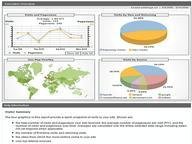Quiz Answer Key and Fun Facts
1. A card is selected at random from a standard 52 card deck. Assuming all cards are equally likely to be selected, what is the probability that a red king was selected?
2. A card is selected at random from a standard 52 card deck. Assuming all cards are equally likely to be selected, what is the probability that a red card or a king was selected?
3. A card is selected at random from a standard 52 card deck. Assuming all cards are equally likely to be selected, what is the probability that a red card was selected given that a king was selected?
4. A card is selected at random from a standard 52 card deck. Assuming all cards are equally likely to be selected, what is the probability that a king was selected given that a red card was selected?
5. A card is selected at random from a standard 52 card deck. We are told that a king was not selected. Assuming all cards are equally likely to be selected, what is the probability that the queen of hearts was selected?
6. Suppose two cards are drawn from a standard 52 card deck without replacement (which means when we draw a card, we don't put it back). Assuming all cards are equally likely to be selected, what is the probability that the second card is an ace given that the first card is an ace?
7. Suppose two cards are drawn from a standard 52 card deck without replacement (which means when we draw a card, we don't put it back). Assuming all cards are equally likely to be selected, what is the probability that the second card is not an ace given that the first card is not an ace?
8. Suppose two cards are drawn from a standard 52 card deck without replacement (which means when we draw a card, we don't put it back). Assuming all cards are equally likely to be selected, what is the probability that both cards are red?
9. Suppose two cards are drawn from a standard 52 card deck without replacement (which means when we draw a card, we don't put it back). Assuming all cards are equally likely to be selected, what is the probability that both cards are not aces?
10. Suppose two cards are drawn from a standard 52 card deck without replacement (which means when we draw a card, we don't put it back). Assuming all cards are equally likely to be selected, what is the probability that the second card is an ace given that the first card is a club?
Source: Author
rodney_indy
This quiz was reviewed by FunTrivia editor
crisw before going online.
Any errors found in FunTrivia content are routinely corrected through our feedback system.

